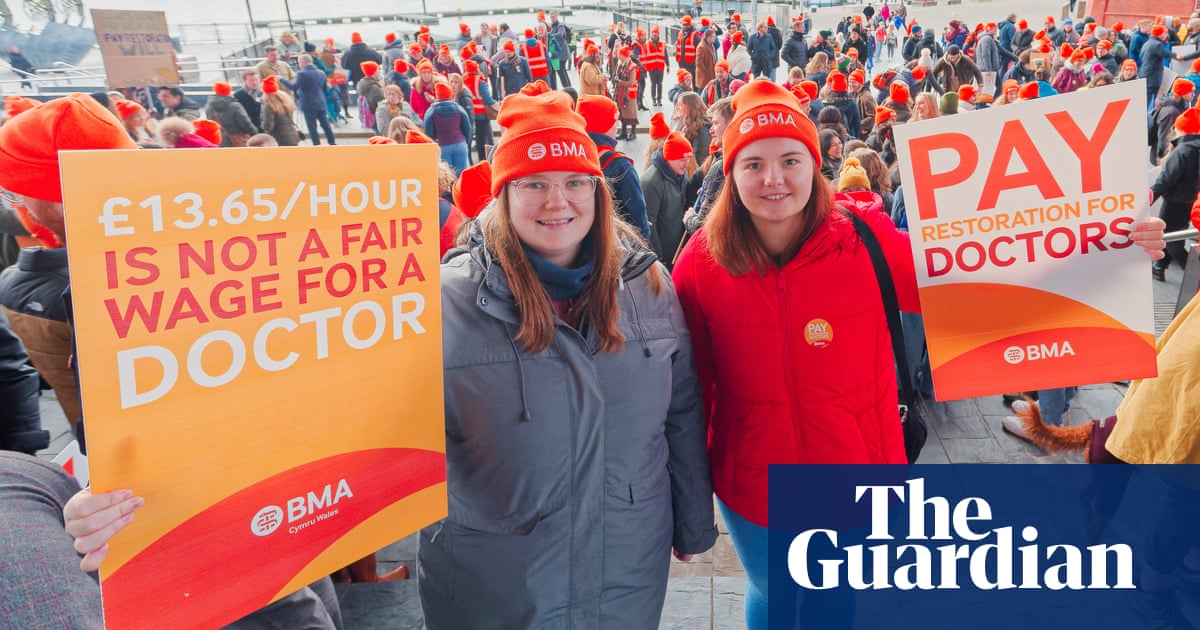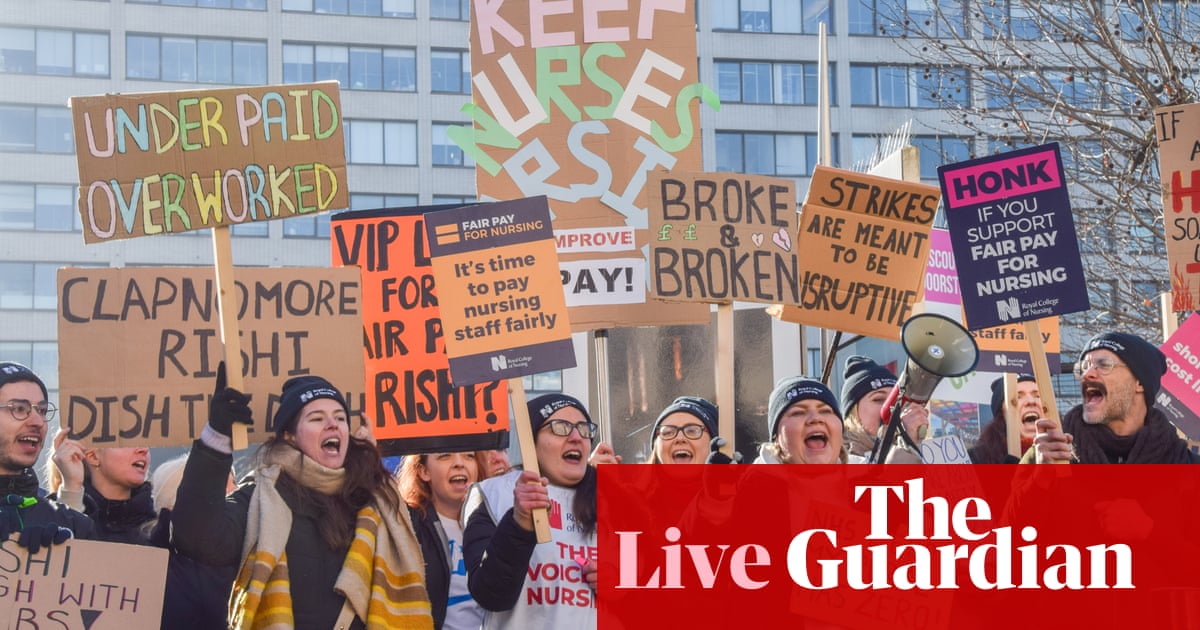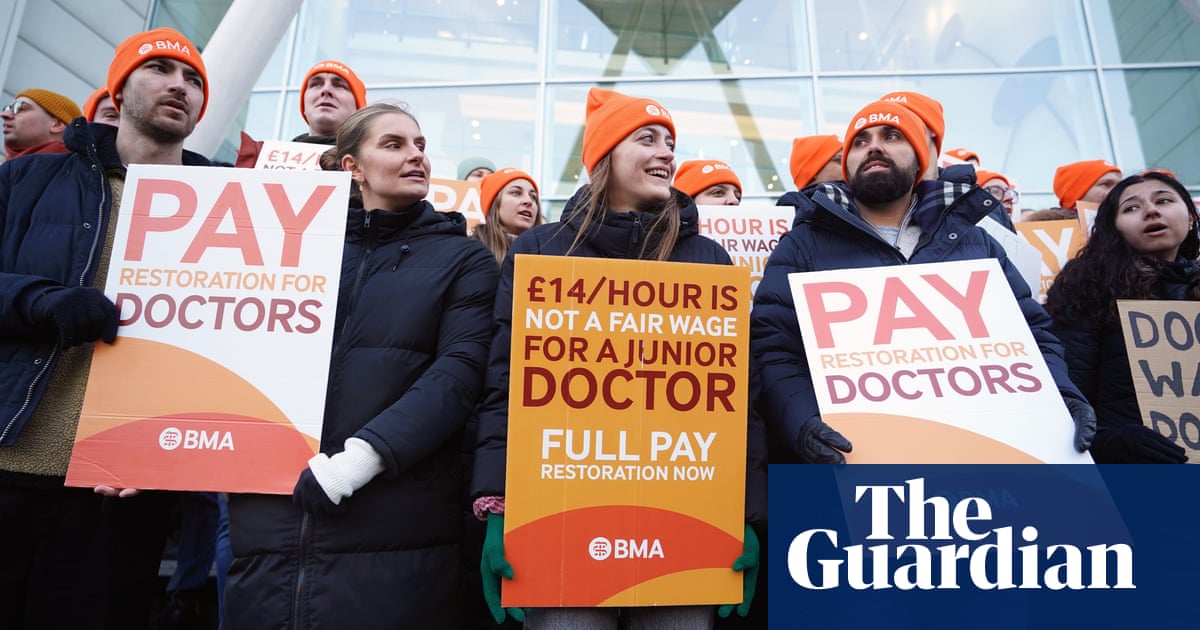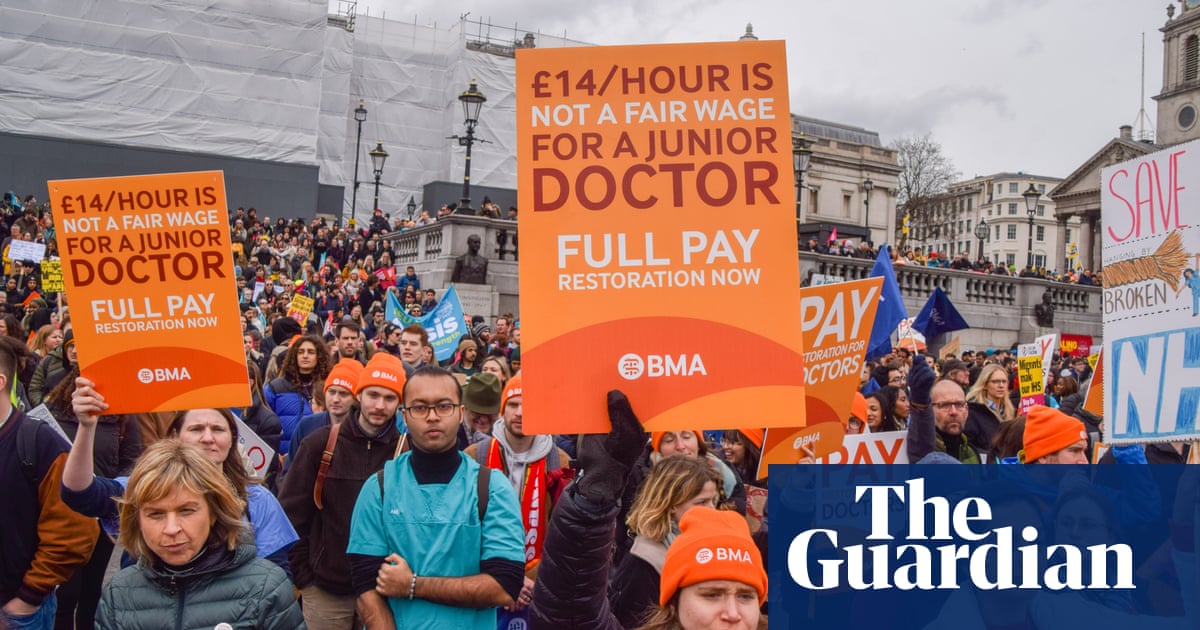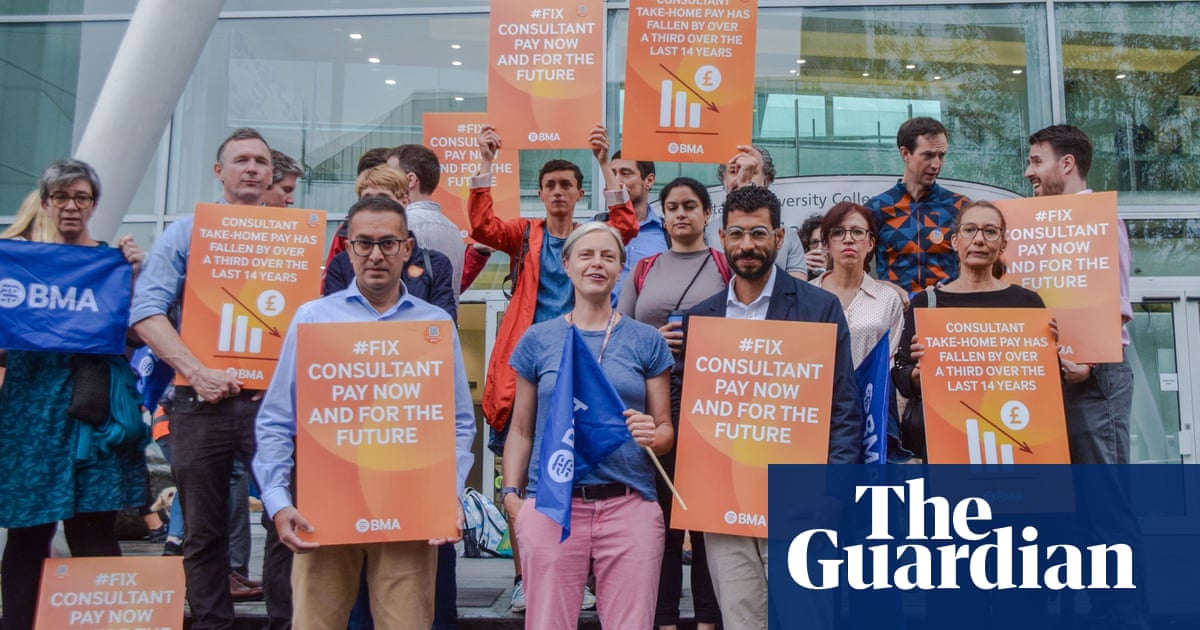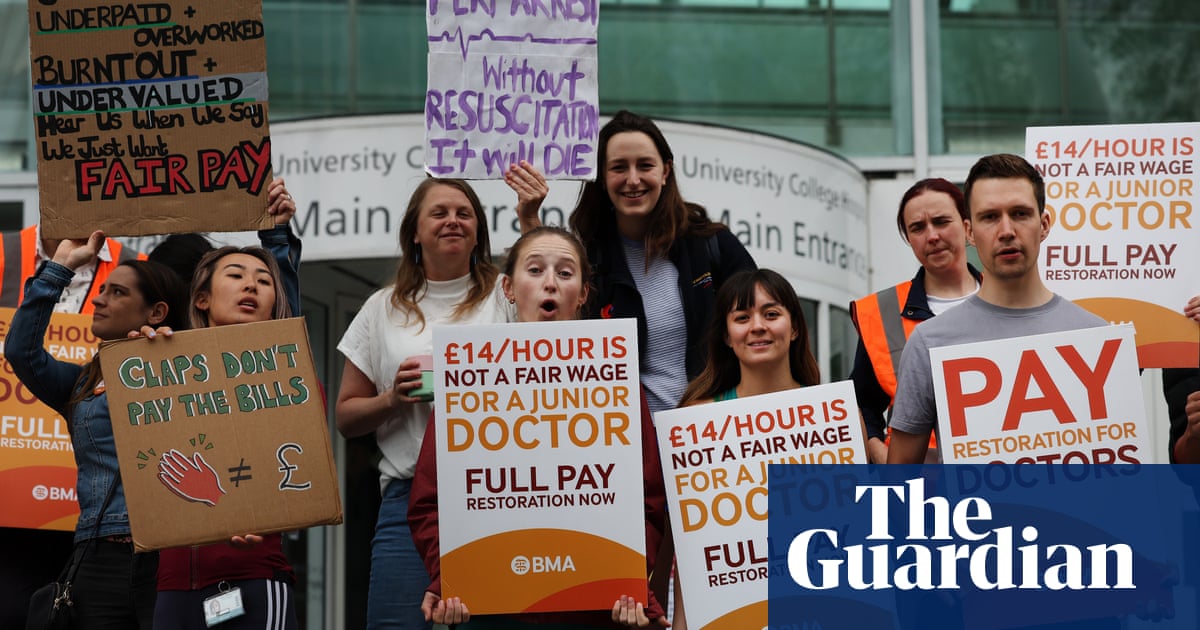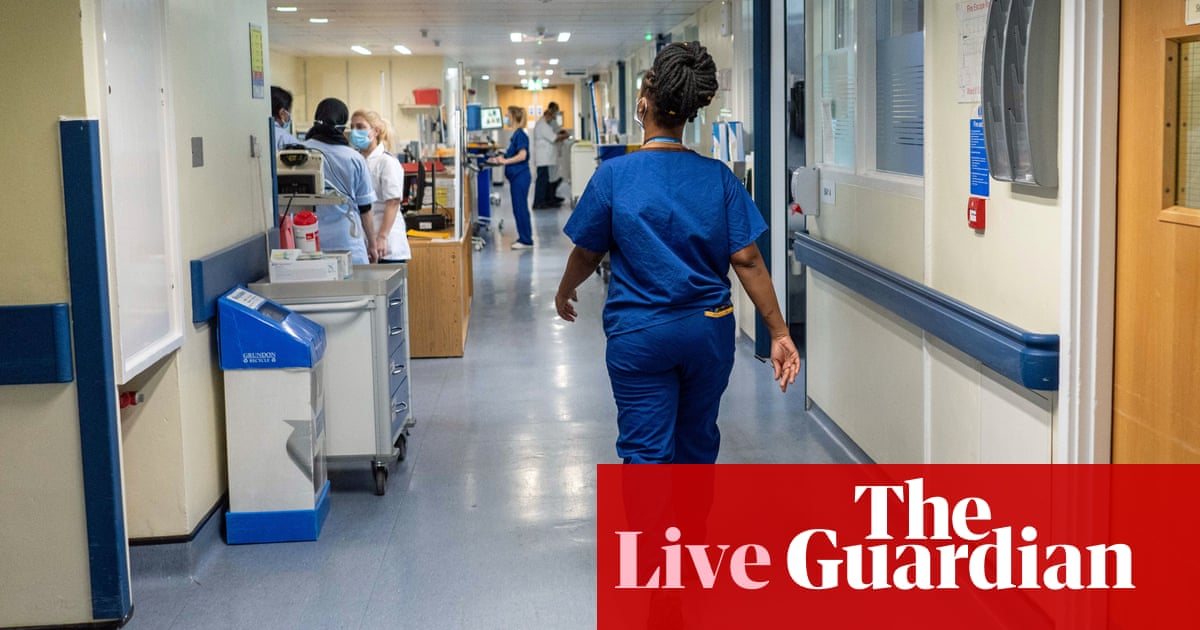
Scottish junior doctors call off strike after getting 12.4% pay rise offer – best equivalent deal in UK
BMA Scotland has called off a planned strike by junior doctors after the Scottish government offered them a 12.4% pay rise.
The award follows a 4.5% pay rise in 2022-23, leading to a cumulative increase of 17.5% over two years.
The Scottish government said the pay deal amounted to a £61.3m investment in junior doctors’ pay and that this was the best pay offer for this group in the UK.
Michael Matheson, the health secretary in the Scottish government, said:
Following months of negotiations with BMA Scotland, I am delighted that we have agreed a pay deal for 2023-24 for our junior doctors. BMA have agreed to suspend strike action in Scotland while they consult with their members.
I hope this investment and the significant commitments we have given around pay and contract reform will show junior doctors how much we value them, and that we are determined to ensure that Scotland is the place for junior doctors to work and train.
Dr Chris Smith, the chair of the BMA’s Scottish junior doctors committee, said his negotiating team had reached the limit of what it thought it could achieve this year and that it did not think strike action would achieve a better offer. “As a result, we have agreed to suspend next week’s strikes and put this offer to our members,” he said.
He went on:
This offer commits the government to working with doctors to restore our pay and prevent pay erosion from occurring in the future.
This is an unprecedented shift from the Scottish government, which is a recognition of the huge decline in real-terms pay that doctors have experienced over the past 15 years, and the huge amount of work needed to undo the damage this has caused to the NHS.
By agreeing to address the way our pay has been cut, and setting out a clear mechanism for doing so, the government is making a serious, welcome commitment to ensuring that pay for junior doctors in Scotland is restored to a fair level.
In England, where junior doctors have also been on strike, the UK government has offered 5%.
The BMA says it wants a 26% pay rise, to restore pay to the equivalent level it was in 2008.
The Scottish government says its offer means someone starting out as a junior doctor would get a pay rise of £3,429 in 2023-24. Someone much more senior would get a pay rise of £7,111.
The term junior doctor is a misnomer, because it refers to all hospital doctors below consultant level. In other workplaces most of them would not be considered junior at all.
Afternoon summary
BMA Scotland has called off a planned strike by junior doctors after the Scottish government offered them a 12.4% pay rise. (See 3.46pm.)
The Scottish government is challenging Westminster to decriminalise all drugs for personal use, in a fresh attempt to tackle Scotland’s chronically high drug death rates.
Murals of cartoon characters, including Mickey Mouse and Baloo from The Jungle Book, painted on the walls of an asylum seeker reception centre to welcome children, have been removed on the orders of the immigration minister, Robert Jenrick.
Keir Starmer has said he and the former senior civil servant Sue Gray knew and followed the rules over her appointment as his chief of staff, but admitted to frustrations at not being able to defend the hiring while it was scrutinised by the Whitehall watchdog.
Starmer has been accused of “wavering on climate commitments” after the Labour party refused to commit to the £11.6bn climate funding pledge made to the world’s poorest nations.
A rightwing lobby group that does not declare its donors is spearheading a campaign to undermine the spread of the four-day week in the UK.
Priti Patel launches bid to water down Commons motion criticising 7 Johnson loyalists who attacked privileges inquiry
Dame Priti Patel, the former home secretary, is leading an attempt to water down the motion being debated on Monday criticising the MPs who spoke out against the privileges committee’s investigation into Boris Johnson.
Patel is one of seven Tory MPs accused in a recent privileges committee report of trying to undermine its inquiry into Johnson by publicly denouncing it as biased.
On Monday MPs will debate the recent report, and the motion proposed by the committee. Without naming Patel or the other six Tories, it says that when the privileges committee is carrying out an inquiry, MPs “should not impugn the integrity of that committee or its members or attempt to lobby or intimidate those members or to encourage others to do so, since such behaviour undermines the proceedings of the house and is itself capable of being a contempt”.
Patel has tabled an amendment that would remove the reference to impugning the integrity of the committee, or intimidating its members.
Instead, her motion just says that, when the committee is carrying out an inquiry, MPs “should not attempt personally to lobby or intimidate those members or to encourage others to do so, since such behaviour undermines the proceedings of the house and is itself capable of being a contempt”.
No one has accused the seven Tories of trying to personally lobby members of the committee; the accusation is that they maligned them on Twitter, or on the media.
If Patel’s amendment were to pass, it would mean she and her six colleagues would avoid the embarrassment to the Commons voting to implicitly condemn their conduct.
Brendan Clarke-Smith and Dame Andrea Jenkyns, another two of the seven Tories singled out for criticism by the privileges committee, have signed Patel’s amendment. The other four Tories – Nadine Dorries, Sir Jacob Rees-Mogg, Mark Jenkinson and Sir Michael Fabricant – have not yet signed it.
Patel, Jenkyns, Rees-Mogg and Fabricant were all included in Johnson’s resignation honours. Dorries was expecting to be included, too, but her peerage was blocked.
Wendy Chamberlain, the Lib Dem MP, has tabled an alternative amendment saying all seven Tories named in the report should face an investigation over claims they committed a contempt of parliament.
It is for the speaker to decide whether amendments are called, and it is possible that he could decide that neither should be put to a vote.
Turning back to benefit overpayments and underpayments (see 12.32pm), in the comments Dora73 asks:
Is the rise in the DWP fraud figures not explained by Covid/furlough/job retention scheme false/fraudulent/over claims?
The answer seems to be yes. This chart shows overpayment rates, according to when a claim started, and it shows that claims lodged during the first lockdown have a far higher overpayment rate than other claims. “Overpayment”, in this context, covers fraudulent claims as well as mistakes.
Scottish junior doctors call off strike after getting 12.4% pay rise offer – best equivalent deal in UK
BMA Scotland has called off a planned strike by junior doctors after the Scottish government offered them a 12.4% pay rise.
The award follows a 4.5% pay rise in 2022-23, leading to a cumulative increase of 17.5% over two years.
The Scottish government said the pay deal amounted to a £61.3m investment in junior doctors’ pay and that this was the best pay offer for this group in the UK.
Michael Matheson, the health secretary in the Scottish government, said:
Following months of negotiations with BMA Scotland, I am delighted that we have agreed a pay deal for 2023-24 for our junior doctors. BMA have agreed to suspend strike action in Scotland while they consult with their members.
I hope this investment and the significant commitments we have given around pay and contract reform will show junior doctors how much we value them, and that we are determined to ensure that Scotland is the place for junior doctors to work and train.
Dr Chris Smith, the chair of the BMA’s Scottish junior doctors committee, said his negotiating team had reached the limit of what it thought it could achieve this year and that it did not think strike action would achieve a better offer. “As a result, we have agreed to suspend next week’s strikes and put this offer to our members,” he said.
He went on:
This offer commits the government to working with doctors to restore our pay and prevent pay erosion from occurring in the future.
This is an unprecedented shift from the Scottish government, which is a recognition of the huge decline in real-terms pay that doctors have experienced over the past 15 years, and the huge amount of work needed to undo the damage this has caused to the NHS.
By agreeing to address the way our pay has been cut, and setting out a clear mechanism for doing so, the government is making a serious, welcome commitment to ensuring that pay for junior doctors in Scotland is restored to a fair level.
In England, where junior doctors have also been on strike, the UK government has offered 5%.
The BMA says it wants a 26% pay rise, to restore pay to the equivalent level it was in 2008.
The Scottish government says its offer means someone starting out as a junior doctor would get a pay rise of £3,429 in 2023-24. Someone much more senior would get a pay rise of £7,111.
The term junior doctor is a misnomer, because it refers to all hospital doctors below consultant level. In other workplaces most of them would not be considered junior at all.
Sunak urged to develop rules before general election to stop political parties misusing AI in campaigning
Rishi Sunak has been urged to set out guidance as to how political parties should and shouldn’t use artificial intelligence when they campaign in the general election.
The Demos thinktank says that, with major elections due next year in countries including the US, the UK, India, Australia and Mexico, this will be “the first major electoral cycle in the era of widespread generative AI” and that the risk of voters being misled by AI content is high.
In a letter to Sunak, Polly Curtis, the head of Demos, said that, while legislation covering this problem was likely to come at some point in the future, it would probably be too late for the general election. She said Sunak and other party leaders should act now. She told the PM:
We are calling on all the major UK political parties to play their part in trying to safeguard the integrity of our democratic processes by developing and publishing policies about how they will use generative AI in their campaigning, setting out what they will and won’t understand as an acceptable use, how they will protect personal data within that and how they will be transparent with voters about their use of AI.
Explaining the scale of the problem, she said:
We are growing increasingly concerned about the potential for the digital disruption around elections to be rapidly amplified in coming months by the ease with which the new technology can be accessed and deployed.
This could look like AI-generated images of candidates doing heroic things, that never happened. Or it could be attack adverts on opponents, that are simply made up. At some point, a political candidate will give a speech that was written with ChatGPT that contains ‘hallucinated’ statistics. This doesn’t need to be officially sanctioned – you just need one campaign volunteer to get over-enthusiastic with the technology and you have a misinformation row on your hands that will make voters mistrust more of the information that they see.
Beyond political actors, the risks continue: women politicians who already face online hate on a daily basis will find manipulated, sexualised images of them circulating – such as pornographic deepfakes. Or outside actors looking to subvert democracy could create AI flooding social media with false or misleading information about the election.
Curtis’s colleague Ellen Judson, the head of the Centre for the Analysis of Social Media at Demos, has written more about the problem in an article for the Guardian which you can read here.
Scottish government floats idea of setting up citizens" assembly to consider legalising drugs in regulated market
The Scottish government is not just proposing decriminalising drugs for personal use; in its policy paper, it suggests there should be a debate about legalising drugs, within a regulated market. It floats the idea of setting up a citizens’ assembly to consider the proposition.
It says:
Decriminalisation for personal supply, as with prohibition, provides no additional control over the market and essentially continues to leave it in the hands of organised crime. It continues to provide revenue to fund other illegal activity, further driving violence and crime in our communities. It also accepts that there can be no quality or safety controls on the substances people are consuming, something we simply wouldn’t accept with other, legal and regulated harmful products like alcohol or tobacco.
While we do not currently advocate for this policy, implementing a more evidence-based approach to drugs policy could be the basis for considering the potential of introducing regulated markets for the reduction of harm and the safe control of substances. This could be supported by a citizens’ assembly to consider the evidence and give a perspective from a representative sample of the public. This would enable a mature, informed conversation about the level of regulation and control that we as a society are comfortable with for substances, based on an expert assessment of their relative harms.
A debate of this kind could consider the many ways in which substances could be regulated, including licensed sales, expanded pharmacy provision or state run monopolies and the means for achieving this. Which measures are most appropriate for which drug should be determined by the evidence. A considered, methodical and cautious approach would be essential. In Canada’s regulated cannabis market a staged approach was taken, introducing new products slowly over time. Starting with strict regulation allows for the possibility for later easing, if and when evidence and evaluation proves that it is safe to do so.
What Scottish government says about how evidence supports decriminalising drugs for personal use
Here is an extract from the Scottish government’s policy paper explaining why it is advocating decriminalising drugs for personal use. The document is laden with footnotes (there are 92 of them, for just 12 pages of text – that’s why they are claiming it is “evidence based”) and all the links in this passage lead to documents referenced in the relevant footnote.
Using the evidence from other countries, decriminalising drugs for personal use would help and support people rather than criminalise and stigmatise them; freeing individuals from the fear of accessing treatment and support, reducing drug related harms and, ultimately, improving lives.
In addition to these critical public health benefits, people who use drugs would no longer be channelled into the criminal justice system, reducing the costs to the justice system. Decriminalisation could result in fewer people being imprisoned and free up law enforcement resources to address other priorities.
Decriminalisation is no longer as radical a proposal as it was. In fact, 30 countries around the world have now recognised the harm caused by criminalisation and moved to change their drug laws, in different ways and with varying levels of effectiveness. In 2018, the UN chief executives board, which includes the head of every UN agency agreed the first ‘UN common position supporting the implementation of the international drug control policy through effective inter-agency collaboration’. The common position committed ‘to promote alternatives to conviction and punishment in appropriate cases, including the decriminalisation of drug possession for personal use, and to promote the principle of proportionality, to address prison overcrowding and overincarceration by people accused of drug crimes’.
While there are many factors that have an impact on drug use and substance issues – including social, cultural and economic factors – evidence indicates that decriminalisation directs more people into treatment, reduces criminal justice costs, and reduces the negative impact that a criminal conviction can have on a person who uses drugs. While the research base is complex, limited and growing rapidly, the majority of studies on decriminalisation have found that people’s usage tends to remain the same and in cases where usage does increase, the change is generally small and may be limited to adults rather than young people.
Reeves signals Labour not ruling out getting rid of two-child benefit cap, but stresses any pledge would have to be funded
Rachel Reeves, the shadow chancellor, has refused to commit an incoming Labour government to scrapping the two-child benefit cap but signalled it could be lifted in a party review of universal credit.
The cap, introduced by David Cameron’s coalition government, means that families on universal credit with more than two children do not get extra funding for additional children unless they are the result of multiple births or conceived by rape or coercion.
The policy, criticised by many as a “rape clause”, has been condemned by senior Labour figures. Jonathan Ashworth, Labour’s shadow work and pensions secretary, described it recently as “heinous” and hinted Labour would scrap it.
On Thursday, Keir Starmer was asked whether that was party policy, he replied: “That isn’t our policy and if it changes, I’ll let you know.” Critics, including the Scottish Labour MSP Monica Lennon, read that as Starmer ruling out any changes. She posted a tweet describing the policy as “abhorrent”, and saying it should be scrapped.
Speaking to reporters during a visit to British Gas’s Scottish training base in Hamilton, Reeves said Labour was focused on tackling the cost of living crisis by extending the windfall tax to soften the impact of soaring inflation and mortgage costs.
She implied the future of cap was under consideration, but only if doing so passed her stringent costings tests. She said:
[Ashworth] has committed to a fundamental review of how universal credit works across a whole range of areas, because this is not the only area where people have concerns about how universal credit is working.
But you’ll know as well that I’ve said everything in our manifesto will be fully costed and fully funded. If we win the next election, we will inherit the worst economic inheritance that any government has ever been bequeathed by its predecessor.
And that means that there are things we would like to do that we’re not able to do quite as quickly as we would want.
Signalling that the costs of reform were uppermost in her thinking, Reeves said Labour faced “huge demands” from the NHS, transport, the green energy transition. She said it was crucial “everything we do is built on a rock of economic and fiscal stability”.
At the Downing Street lobby briefing the No 10 spokesperson confirmed that ministers are still considering the recommendation from the pay review body for teachers’ pay. (See 8.53am.) They are considering what rise might be appropriate in the context of inflationary pressures, the spokesperson said.
The spokesperson was also asked if Rishi Sunak supported Robert Jenrick, the immigration minister, ordering cartoon murals at an asylum centre for unaccompanied child migrants to be covered up, to stop the place looking too welcoming. (See 11.24am.) The spokesperson said the government did want to deter people from coming to the UK in small boats, but it also wanted to ensure that child migrants in care were safe, secure and supported.
Labour criticises SNP for proposing decriminalising personal drug use
Rachel Reeves, the shadow chancellor, has said an incoming Labour government would not decriminalise drug supply or possession.
“The short answer is no,” she told reporters in Hamilton. She went on:
I find it quite stunning this would be a priority for the Scottish government, when we are today talking about the Tory mortgage bombshell.
[We’ve] got more than 700,000 people in Scotland on NHS waiting lists. Pick an issue. There are so many issues you could be focusing on.
Anas Sarwar, the Scottish Labour leader, said Scotland had exactly the same drugs misuse laws as the rest of the UK yet its drug death figures were three times higher. “It’s their cuts to alcohol and drug health partnerships; it’s their cuts to rehabilitation beds; it’s the failure to properly invest in mental health services,” he said.
He went on:
Every single big problem, [the SNP] seek to find a constitutional divide and fight rather than actually using the powers they have to change people’s lives in Scotland.
Rachel is absolutely right: people right now are struggling to put food on the table and struggling to get access to NHS treatment that could save their lives. And they’re seeing the Scottish government talking about decriminalising drugs for personal supply. I think they’re going to make themselves look even more out of touch.
Sarwar added, however, that he remained in favour of setting up safe consumption rooms – a policy opposed by the Labour leader, Keir Starmer. He said the lord advocate, Dorothy Bain KC, already had the powers to set those up through Scotland’s laws on policing.
Humza Yousaf says decriminalisation for personal use would be "evidence-based and compassionate" drugs policy
Humza Yousaf, Scotland’s first minister, has tweeted about his government’s call for Westminister to allow Scotland to decriminalise drugs for personal use, or to introduce this approach throughout the UK.
Rather optimistically, he says he is willing to cooperate with Westminster on this approach. But No 10 isn’t so keen. (See 12.40pm.)
Yousaf says:
Our radical paper on drug law reform calls for an evidence-based and compassionate approach to tackling drug use. While @scotgov absolutely has responsibilities, many of the levers are in the UK Govt’s hands. We’re willing to work with them to enable us to take a bold approach.
No 10 rejects call from Scottish government for it to be allowed to decriminalise all drugs for personal use
Downing Street has rejected a call from the Scottish government for it to be allowed to decriminalise all drugs for personal use.
The Scottish government has proposed the idea in a policy paper which acknowledges that, because drug policy is reserved to Westminster, Scotland would only be able to implement this approach if the UK government granted it a section 30 order (an opt-out from the reserved power laws in the Scotland Act).
Scotland’s drugs policy minister Elena Whitham said:
These are ambitious and radical proposals, grounded in evidence, that will help save lives.
We want to create a society where problematic drug use is treated as a health, not a criminal matter, reducing stigma and discrimination and enabling the person to recover and contribute positively to society.
While we know these proposals will spark debate, they are in line with our public health approach and would further our national mission to improve and save lives.
We are working hard within the powers we have to reduce drug deaths, and while there is more we need to do, our approach is simply at odds with the Westminster legislation we must operate within.
In response, No 10 said Rishi Sunak has no plans to alter his “tough stance” on drugs.
Asked if Sunak was likely to give the Scottish government the powers it wants to alter drug laws, a Downing Street spokesperson replied:
No. Whilst I haven’t seen those reports I think I’m confident enough to say that there are no plans to alter our tough stance on drugs.




